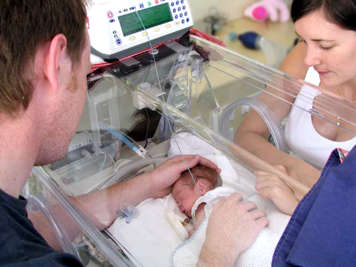Parents of babies in the NICU may have to make difficult decisions for their child's treatment. These decisions often must be made quickly. The health-care team caring for ill and premature newborns will review information, explain options, provide their expert opinion and share in decision making with parents.
The health-care team
All the staff in the NICU do their utmost to make every baby well. It is their desire to see babies get healthy, be discharged from the hospital and grow to be thriving children. The entire facility is designed to make this happen as much as possible.
At the same time, not all babies in the NICU will survive. Some who do may have severely disabling conditions. The health-care team in the NICU is dedicated to providing expert care. They are also committed to providing honest, individualized information that parents and families can then use to participate in important treatment decisions for their baby.
Parents and families
Very few parents expect their baby to be born prematurely or with a health condition that requires care in the NICU. The health-care team will often invite parents to participate when there are major treatment decisions to be made. While it can be overwhelming, exhausting and often frightening, there are some things that parents can do to share in decision making for their baby:
- Ask questions about your baby’s condition and ask for explanations when information is unclear.
- Share your concerns about your baby with the health-care team.
- Share your personal and family values and what you feel is important for your baby and your family.
- Be open to discussing treatment options.
- If you are hesitant or are not ready to make decisions, let the health-care team know.
Some parents need more time to think about the choices, while others would rather take a step back from making decisions and will look to the health-are team to take the lead. Being open with the health-care team about how you see your role is helpful.
One certain thing: uncertainty
Health-care providers almost never speak in absolutes, which is usually what a parent wants to hear. Will my baby get over this and thrive? Will my baby live? Will my baby have a disability? Although it would be reassuring to know the answer to these questions with absolute certainty, even if the answer is negative, the health-care team will likely only be able to answer with probabilities.
While statistics about the survival of very premature babies or babies with a certain medical condition are helpful, they do not address any specific baby’s prognosis. In other words, a health-care provider in the NICU cannot look at a premature baby born at 24 weeks and undoubtedly predict the long-term outcome for that particular infant. At the same time, available statistics and the health-care team’s experience treating many babies can help provide some sense of a baby’s expected course.
What is shared decision-making?
There are often two or more treatment choices for a baby in the NICU. In these situations, the health-care team will encourage parents and families to share their preferences when discussing treatment options. This allows the health-care team to provide as much objective information about choices, options and decisions for a baby. Parents and families can then use the information provided and consider the best option for their baby in the context of their values and preferences.
